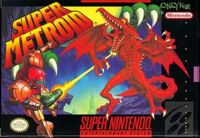Difference between revisions of "Super Metroid"
m |
m |
||
| Line 26: | Line 26: | ||
The game brings with it the integrated map, allowing gamers to track their progress and backtrack far easier. Although it is possible to find map stations to reveal the rooms inside a region, this scratches only the surface of what secret passages lead to. Gamers will not only find extra energy tanks and weapon packs, but also extra powerups not necessary to beat the game. | The game brings with it the integrated map, allowing gamers to track their progress and backtrack far easier. Although it is possible to find map stations to reveal the rooms inside a region, this scratches only the surface of what secret passages lead to. Gamers will not only find extra energy tanks and weapon packs, but also extra powerups not necessary to beat the game. | ||
| + | |||
| + | =Continuity Notes= | ||
| + | |||
| + | *The game follows ''[[Metroid]]'' and ''[[Metroid II: Return of Samus]]'' linearly, being indicated as taking place not long after ''Metroid II''. The opening includes "flashback" scenes of the climactic battles of both games. | ||
=Legacy= | =Legacy= | ||
Revision as of 21:10, 3 April 2010

| |
| Super Metroid | |
| Full Title | Super Metroid |
| Developer | Nintendo |
| Publisher | Nintendo |
| System | Super Nintendo Virtual Console |
| Release Date | Super Nintendo JP March 19, 1994 US April 18, 1994 EU July 28, 1994 Virtual Console US August 20, 2007 JP September 20, 2007 EU October 12, 2007 |
| Genre | Action/Adventure |
| Gallery | GH Gallery |
The third game in the original Metroid 'trilogy' and long considered the definitive game in the series. Super Metroid brings the series back from the handheld and immerses the player in a richer, more diverse Zebes than the one in the first game. Despite being often considered one of the best games on the Super Nintendo, it would be eight years before the series received a sequel.
Story
The game picks up immediately where Metroid II: Return of Samus left off. Samus Aran decides to give the Metroid hatchling to the Ceres spacestation for research. However things go ill after she departs and she receives a distress signal. Upon returning, she discovers the Space Pirate leader, Ridley, has stolen the Metroid hatchling. Samus Aran tracks him down back to Zebes, where the pirate forces have been rebuilt.
Gameplay
Planet Zebes has been expanded into a much larger area now. Once again Samus travels the areas of Crateria, Brinstar, Norfair, and Tourian. New to her adventuring is the underwater region of Maridia and the mysterious ruins of a Wrecked Ship. These six areas make for the series largest game yet and features a whole new variety of new enemies and bosses as well as a few familiar faces.
The gameplay adds a whole new dimension of gameplay. Samus can now fire in eight different directions, making smashing enemies easier. All of Samus's old abilities (sans the Spider Ball) return with new ones to boot. The Speed Booster allows Samus to run faster than ever before. The Grappling Beam adds a whole new dimension of travel. Additional abilities, such as the Wall Jump, make Samus all the more versatile.
The game brings with it the integrated map, allowing gamers to track their progress and backtrack far easier. Although it is possible to find map stations to reveal the rooms inside a region, this scratches only the surface of what secret passages lead to. Gamers will not only find extra energy tanks and weapon packs, but also extra powerups not necessary to beat the game.
Continuity Notes
- The game follows Metroid and Metroid II: Return of Samus linearly, being indicated as taking place not long after Metroid II. The opening includes "flashback" scenes of the climactic battles of both games.
Legacy
Ports
- In 2007, Super Metroid was released for the Virtual Console to promote the release of Metroid Prime 3: Corruption. A demo version was included in Super Smash Bros. Brawl as a Masterpiece.
| Titles in the Metroid Series |
|---|
| Metroid (Zero Mission) - Return of Samus (3DS) - Super Metroid - Other M - Fusion Metroid Prime - Pinball - Echoes - Hunters - Corruption - Federation Force - 4 Metroid Dread |